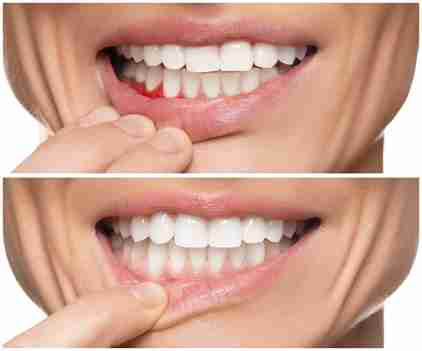Gum disease is a common issue that affects many adults, yet it’s often overlooked until more serious symptoms appear. Understanding how gum disease progresses can help you take timely action and protect your oral health. From initial gum inflammation to advanced stages that threaten teeth, recognising the signs and knowing when to seek help is essential for maintaining a healthy smile.
What Is Gum Disease?
Gum disease, or periodontal disease, is an infection of the gums caused by bacteria in plaque—a sticky film that builds up on teeth. If not removed regularly, plaque hardens into tartar, which irritates the gums and can lead to inflammation.
There are two main stages of gum disease:
- Gingivitis: The early, reversible stage marked by gum redness and bleeding.
- Periodontitis: The advanced stage where the infection damages tissues and bone supporting the teeth.
Understanding these stages helps you take appropriate steps before irreversible damage occurs.
Early Stage: Gingivitis
The earliest phase of gum disease is gingivitis. It usually develops due to poor oral hygiene allowing plaque to build up along the gumline. Common symptoms include:
- Gums that are red, swollen, or tender
- Bleeding during brushing or flossing
- Mild bad breath
At this stage, the damage is reversible with consistent care. Brushing twice daily, flossing, and using an antibacterial mouthwash can restore gum health. Regular dental check-ups are key to catching gingivitis early.
Progression to Periodontitis
If gingivitis is left untreated, it can progress to periodontitis. This is when the infection spreads below the gumline, forming pockets between teeth and gums that trap more bacteria.
Key signs of periodontitis include:
- Gums pulling away from teeth, creating deep pockets
- Persistent bad breath or bad taste
- Loose or shifting teeth
- Gum recession exposing more tooth surface
Periodontitis causes loss of bone and connective tissue, which can lead to tooth loss if untreated.
Stages of Periodontitis Explained
Periodontitis itself can be divided into stages reflecting severity:
Stage | Description | Typical Signs |
Early | Mild bone loss and pocket depth of 4mm | Slight gum recession, bleeding |
Moderate | Moderate bone loss, pockets 5-6mm | Noticeable gum recession, loose teeth |
Advanced | Severe bone loss, pockets 7mm+ | Tooth mobility, abscesses, pain |
Your dentist will assess these factors using X-rays and clinical probing to tailor treatment.
Why Timely Treatment Matters
At moderate or advanced stages, professional intervention is necessary to stop disease progression. Treatment options include:
- Deep cleaning (scaling and root planing) to remove tartar
- Antibiotic therapy to control infection
- Surgery in severe cases to restore supportive tissues
Ignoring gum disease can lead to tooth loss and impact overall health. Studies have linked untreated periodontitis to heart disease, diabetes, and respiratory issues.
Gum Disease and Orthodontic Treatments
If you’re wearing invisalign Ruislip or other orthodontic appliances, maintaining gum health is crucial. Appliances can trap food and plaque, increasing the risk of gum inflammation.Regular dental cleanings and using fluoride toothpaste are recommended. Your orthodontist may also advise specific oral hygiene tools to keep your gums healthy throughout treatment.
Caring for Dental Implants with Gum Disease Risks
Patients with dental implants Ruislip need to be especially vigilant about gum disease. Implants don’t get cavities, but the surrounding gum tissue can develop peri-implantitis, a form of gum disease affecting implants.Good oral hygiene and regular check-ups help protect implants. If gum disease develops around implants, prompt treatment is essential to avoid implant failure.
Practical Tips to Prevent Gum Disease
Here are some everyday habits to support gum health:
- Brush twice daily using a soft-bristled toothbrush: Brushing your teeth twice a day removes plaque and food particles that can cause gum irritation. A soft-bristled toothbrush is gentle on the gums, helping to prevent damage and reduce inflammation. Using the right technique is equally important to ensure thorough cleaning without harming delicate gum tissue.
- Floss or use interdental brushes daily: Flossing or using interdental brushes helps clean the spaces between teeth where a toothbrush can’t reach. This removes trapped food and plaque, preventing bacteria buildup that leads to gum disease. Regular cleaning between teeth is essential to stop inflammation and maintain healthy gums.
- Avoid tobacco products, which worsen gum disease risk: Smoking and other tobacco use significantly increase the risk of gum disease by weakening your immune system and reducing blood flow to the gums. This makes it harder for your gums to fight infection and heal. Quitting tobacco improves oral health and supports the success of treatments like dental implants Ruislip or orthodontics.
- Maintain a balanced diet rich in vitamins C and D: A diet full of fresh fruits, vegetables, and nutrient-rich foods supports gum health by boosting your body’s ability to repair and fight infections. Vitamins C and D play key roles in maintaining strong connective tissue and a healthy immune response, both vital for preventing gum disease progression.
- Visit your dentist regularly for professional cleanings: Professional dental cleanings remove tartar buildup that can’t be eliminated by brushing alone. Regular check-ups help spot early signs of gum disease before they worsen, allowing timely intervention. Your dentist can also provide personalised advice tailored to your oral health needs.
Incorporating these habits alongside treatments like invisalign Ruislip or dental implants Ruislip improves long-term oral health.
When to See a Dentist
If you notice bleeding gums, persistent bad breath, or gum recession, don’t delay booking a dental appointment. Early diagnosis and treatment make a big difference.Your dentist will examine your gums, measure pocket depths, and may take X-rays to check bone levels. This thorough assessment guides the best treatment plan tailored to your stage of gum disease.
Conclusion
Understanding the stages of gum disease empowers you to protect your smile. From early gingivitis to more serious periodontitis, recognising symptoms and acting promptly can save your teeth and overall health. Whether you’re undergoing orthodontic treatment with invisalign Ruislip or managing dental implants Ruislip, good oral hygiene and professional care are key. Smilo Dental Implants Group is dedicated to supporting your dental health journey with expert advice and personalised treatments.


